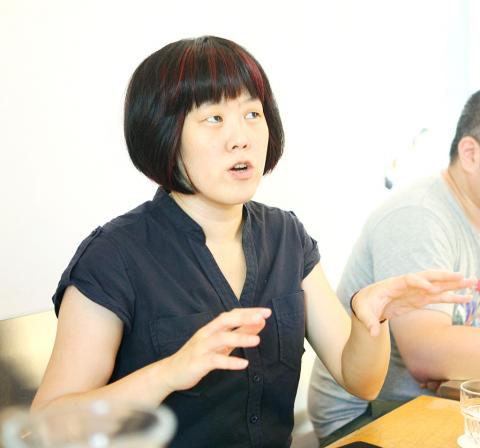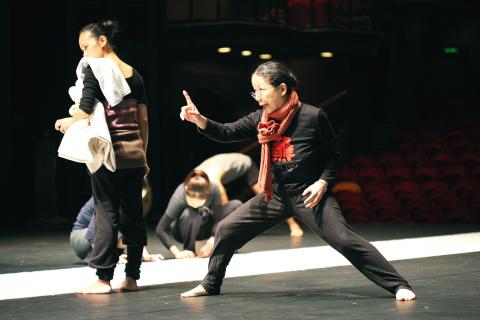Ten years is a long time to film a documentary, but for director Singing Chen (陳芯宜), it was worth it.
Titled The Walkers (行者), it explores the career of choreographer Lin Lee-chen (林麗珍), the renowned founder and artistic director of the Legend Lin Dance Theatre (無垢舞蹈劇場) who has spent the past 19 years creating three modern dance pieces — Miroirs de Vie (Mirrors of Life, 醮, 1995), Anthem to the Fading Flowers (花神祭, 2000) and Song of Pensive Beholding (Chants de la Destinee, 觀, 2009). Combined, they are Lin’s tribute to Heaven, Earth and man.
Chen says the decade spent filming the documentary revealed similarities between the filmmaker and the subject.

Photo Courtesy of Chin Cheng-tsai and Public Television Service
“Feeling adrift during her 30s, it took Lin 10 years to complete Mirrors of Life, which she did in her 40s … I began making the film at age of 30 and just finished it,” says the director, 40. She added that their relationship was “built on mutual trust, openness and support. It wouldn’t have lasted as long otherwise.”
Doubt in success
The project began in 2004, four years after Bundled (我叫阿銘啦), Chen’s critically-acclaimed debut.

Photo Courtesy of Chin Cheng-tsai and Public Television Service
With success, however, came artistic doubt about the direction her life and career were taking. Then she was presented with the opportunity to film Lin.
“I was shocked by the sheer amount of repetition demanded of the performers during the rehearsals ... It’s like a kung-fu master-disciple relationship. It’s not only teaching [performance] techniques. It’s a philosophy of life,” Chen says.
Lin, a native of Keelung, grew up attending temple ceremonies. Before setting up Legend in 1995, she had spent 10 years conducting field work on Taiwanese folk traditions, collecting material on ritual dances, temple rites and religious music.
Often described as mythical, primitive and meditative, Lin’s choreography is deeply rooted to the earth, a contrast to the upward movements of Western dance.
Slow motion
Lin’s dancers always move at an excruciatingly slow, measured pace, half-crouched, their upper body completely still. Her world is filled with mesmerizing geometry and studied stillness that transports viewers into a mythical reality. Having traveled with Legend to France, Russia and Mexico, Chen observes that Lin’s energy is calming.
Moving to the clear
In 2007, Chen completed her second feature God Man Dog (流浪神狗人), an allegory told through a mosaic of characters about how value is assigned in a capitalist society. The director says she wouldn’t have made the film had it not been for Lin, who helped her address the confusions she was experiencing.
Chen says that making documentaries about artists is a way to seek answers to her life’s questions. Her feature-length documentary, Ears Switched Off and On (如果耳朵有開關, 2013), is about Taiwan’s pioneering sound artists Dino, Wang Fu-jui (王福瑞) and Lin Chi-wei (林其蔚). Mountain Spirits (山靈, 2014) focuses on artist Wang Wen-chih (王文志), noted for creating huge installations using natural materials such as bamboo, rattan and wood.
Chen says that although these artists work in different mediums, their goals are essentially the same.
“To put it simply, through the ritual of dancing, Lin cleanses the mind and attains Zen-like clarity. Wang Wen-chih creates a state of tranquility through his woven space. While it may be difficult for people to understand, the sound artists actually feel calm amid deafening noises,” Chen says.
“For these artists, art is like a ritual, created in the hope of putting others in a state of serenity.”
Social activism
Over the years, Chen has increasingly become involved in social movements, fighting for the rights of the disadvantaged.
She has participated in the preservation movement of Losheng (Happy Life) Sanatorium (樂生療養院) and protested against the Wenlin Yuan (文林苑) urban renewal project in Shilin District (士林) and the forced demolition of Taipei’s Huaguang Community (華光社區). In the process, she has learned to become more than just an observer behind the camera.
“Sometimes when I came to a protest, people were doing more filming than trying to hamper the police. I was disappointed. We should experience the whole thing with our bodies,” she says. “If I hadn’t been kicked and held down by the police, I wouldn’t know how it actually felt.”
Rather than documenting street clashes and confrontations, Chen address her concerns with fictional pieces such as The Clock (阿霞的掛鐘, 2011), a short film that examines urban renewal projects, and The Pig (豬, 2013), based on the controversial demolition of the Huaguang Community.
“I want to examine the question as to how individuals should lead their lives,” she says.
Chen says she considers The Walkers an offering rather than a creation.
“Many people say I should cut down Lin’s talking and make the work more artistic. But I don’t want to. It is a gift ... I choose to keep [the interviews] in the hope that someone will listen and feel something. I didn’t make the film to be part of my own artistic achievement. Rather, I wanted to share with others how I feel and what I have learned over the past 10 years,” Chen says.
Taiwan documentary fest
The Walkers and Mountain Spirits will be screened at the 2014 Taiwan International Documentary Festival (第九屆台灣國際紀錄片影展), which runs from Oct. 9 to Oct. 19. The former will be commercially released in Taiwan next April. A two-part version of The Walkers will air on Public Television Service (PTS, 公共電視台) at noon on Oct. 26 and Nov. 2
The Legend Lin Dance Theatre returns to the National Theater (國家戲劇院) for an encore performance of Song of Pensive Beholding from Friday to Sunday. NT$500 to NT$900 are the only tickets left, available at NTCH box offices and online through www.artsticket.com.tw. Next year, Mirrors of Life will be re-staged to celebrate the dance troupe’s 20th anniversary.

Last week the story of the giant illegal crater dug in Kaohsiung’s Meinong District (美濃) emerged into the public consciousness. The site was used for sand and gravel extraction, and then filled with construction waste. Locals referred to it sardonically as the “Meinong Grand Canyon,” according to media reports, because it was 2 hectares in length and 10 meters deep. The land involved included both state-owned and local farm land. Local media said that the site had generated NT$300 million in profits, against fines of a few million and the loss of some excavators. OFFICIAL CORRUPTION? The site had been seized

Next week, candidates will officially register to run for chair of the Chinese Nationalist Party (KMT). By the end of Friday, we will know who has registered for the Oct. 18 election. The number of declared candidates has been fluctuating daily. Some candidates registering may be disqualified, so the final list may be in flux for weeks. The list of likely candidates ranges from deep blue to deeper blue to deepest blue, bordering on red (pro-Chinese Communist Party, CCP). Unless current Chairman Eric Chu (朱立倫) can be convinced to run for re-election, the party looks likely to shift towards more hardline

Sept. 15 to Sept. 21 A Bhutanese princess caught at Taoyuan Airport with 22 rhino horns — worth about NT$31 million today — might have been just another curious front-page story. But the Sept. 17, 1993 incident came at a sensitive moment. Taiwan, dubbed “Die-wan” by the British conservationist group Environmental Investigation Agency (EIA), was under international fire for being a major hub for rhino horn. Just 10 days earlier, US secretary of the interior Bruce Babbitt had recommended sanctions against Taiwan for its “failure to end its participation in rhinoceros horn trade.” Even though Taiwan had restricted imports since 1985 and enacted

Enter the Dragon 13 will bring Taiwan’s first taste of Dirty Boxing Sunday at Taipei Gymnasium, one highlight of a mixed-rules card blending new formats with traditional MMA. The undercard starts at 10:30am, with the main card beginning at 4pm. Tickets are NT$1,200. Dirty Boxing is a US-born ruleset popularized by fighters Mike Perry and Jon Jones as an alternative to boxing. The format has gained traction overseas, with its inaugural championship streamed free to millions on YouTube, Facebook and Instagram. Taiwan’s version allows punches and elbows with clinch striking, but bans kicks, knees and takedowns. The rules are stricter than the